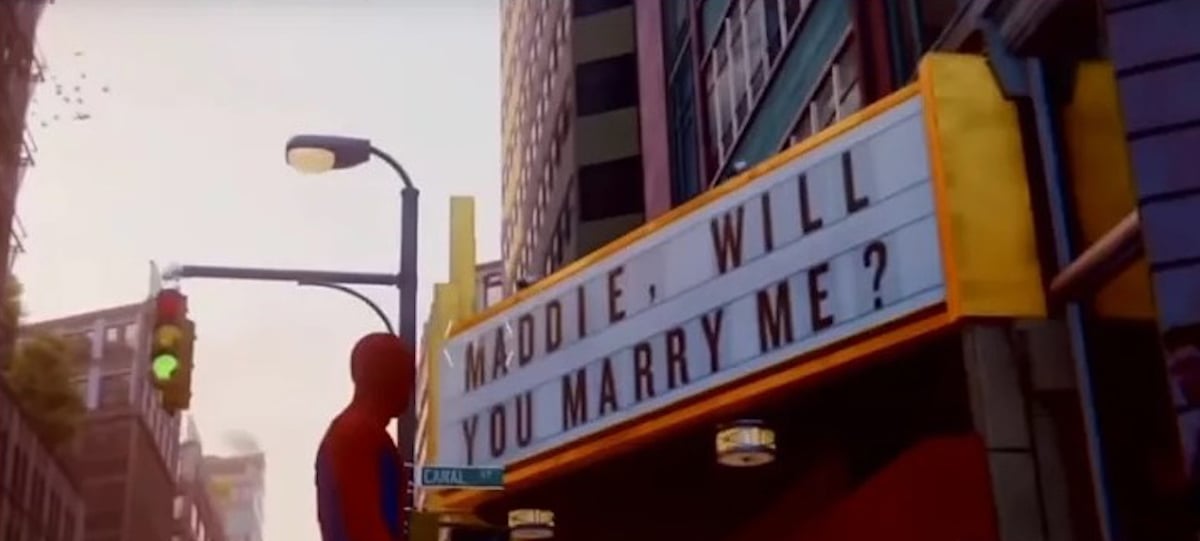Insomniac Games’ new Spider-Man game included an Easter egg featuring one fan’s marriage proposal to his girlfriend. What might have been a romantic tale to tell didn’t go as planned, and serves as proof positive that we shouldn’t rush to report one side of a story.
Back in May, Tyler Schultz asked the team behind Insomniac Games’ Spider-Man game to include an Easter egg proposing marriage to his girlfriend, Madison Gamble. The company responded to his tweet, and in the newly released game, Spidey encounters a movie theater in downtown New York City where the marquee reads, “MADDIE, WILL YOU MARRY ME?”
It’s a sweet gesture in theory, and nice of the company to be responsive, although it’s important to keep in mind that in proposals, there are two people involved, and one may have no interest in saying yes. Schultz’s plans went awry when Gamble broke up with him prior to the game’s release. There is, however, quite a bit more to the situation than one of jilted love and a proposal gone wrong.
Life happens, relationships come and go, and this may have remained a blink-and-you’ll-miss-it detail in the game that went otherwise unaddressed. But according to Kotaku, the story didn’t end there. Schultz uploaded a video to YouTube (which has since been removed) where he claimed that Gamble broke off their relationship “to go with [his] brother.”
Many headlines have run with “world’s saddest Easter egg” after Schultz himself referred to it as such, and included his claims about Gamble deserting him for his brother. It’s unclear why Kotaku, in its initial reporting, only reported the story from Schultz’s perspective and did not include Gamble’s until a two-sentence update later on. The article currently has almost 1 million page views.
Kotaku later heard from Gamble, who says the relationship with Schultz’s half-brother did not begin until well after their break-up, and she also gave her side of the story to The Houston Press.
In the Houston Press, reporter Jef Rouner wrote, “I was immediately suspicious of the story. In a post-GamerGate world (assuming that we ARE post), taking any supposedly heartbroken male gamer at his word over something like this is rather naïve.” Pressingly, he pointed out: “One thing I noticed in coverage of the proposal story was that no one had apparently bothered to talk to [Maddie] Gamble about it.”
While several outlets reported on the failed Easter egg as a sad case sympathetic to Schultz’s report, Rouner reached out to hear Gamble’s take on the events. In a message to Rouner, she explained her relationship with Schultz in detail, including that it began when they were fifteen, and alleging that she had to deal with issues like his “violent outbursts.”
Gamble told Rouner, “Our relationship had issues both mentally and physically … He never understood me unfortunately. Even the proposal which he thought was the save all of our relationship was never the way I would have like to be proposed to. I never liked video games, but I sat through them because I loved him.”
This whole story is increasingly uncomfortable the more layers are peeled back, but it’s demonstrative of how quickly the media can rush to post an article based on an anecdote that clicks through well—”world’s saddest Easter egg”—without much thought concerning the real humans behind the screen.
These are young people here, intimate details of their lives now laid bare because Schultz decided to make public a series of events that should have remained private. Further, there was no way he was interested in framing Gamble as anything except the villain in the story. She then had to defend herself against personal attacks and speak to reporters about her former relationship, where she stood accused leaving a man for his brother. This is a situation that no one should ever have to be in.
Rouner continued:
Public proposals can be very manipulative. They put the recipient in a spot where refusal becomes a public counterattack, or in Gamble’s case a post-relationship smear. Dean Burnett, writing on the subject for The Guardian, says “This is a world where women can be vilified for refusing the sexual advances of a stranger, so actively rejecting someone you’re committed to could be far worse again.”
I don’t think that the various outlets that reported on the story one-sided necessarily set out to do so with malicious intent. Everyone’s on a deadline, and there’s a rush to get content posted. (We know this all too well.)
But in a post-Gamergate world (and as Rouner noted, is it really post?) an abundance of caution should be used in presenting a story about an aggrieved male gamer and the woman who wronged him—especially before the woman has been given the opportunity to weigh in.
“Video game journalism has unethically reprinted his accusation that Gamble left him for his brother without seeking comment from the other party,” Rouner concluded, showing that the rush to judgment and much of the damage is already done: “One look at the Kotaku Facebook page under the story reveals a rich vein of misogyny and hatred for Gamble as Schultz paints her in his story of a romantic gesture gone bad.”
There are no winners or upsides in this story, and I very much hope that Gamble will not see continued harassment. This is a case where “ethics in video game journalism” went out the window.
(via The Houston Press, image: Insomniac Games/Kotaku)
Want more stories like this? Become a subscriber and support the site!
—The Mary Sue has a strict comment policy that forbids, but is not limited to, personal insults toward anyone, hate speech, and trolling.—










Published: Sep 10, 2018 02:55 pm